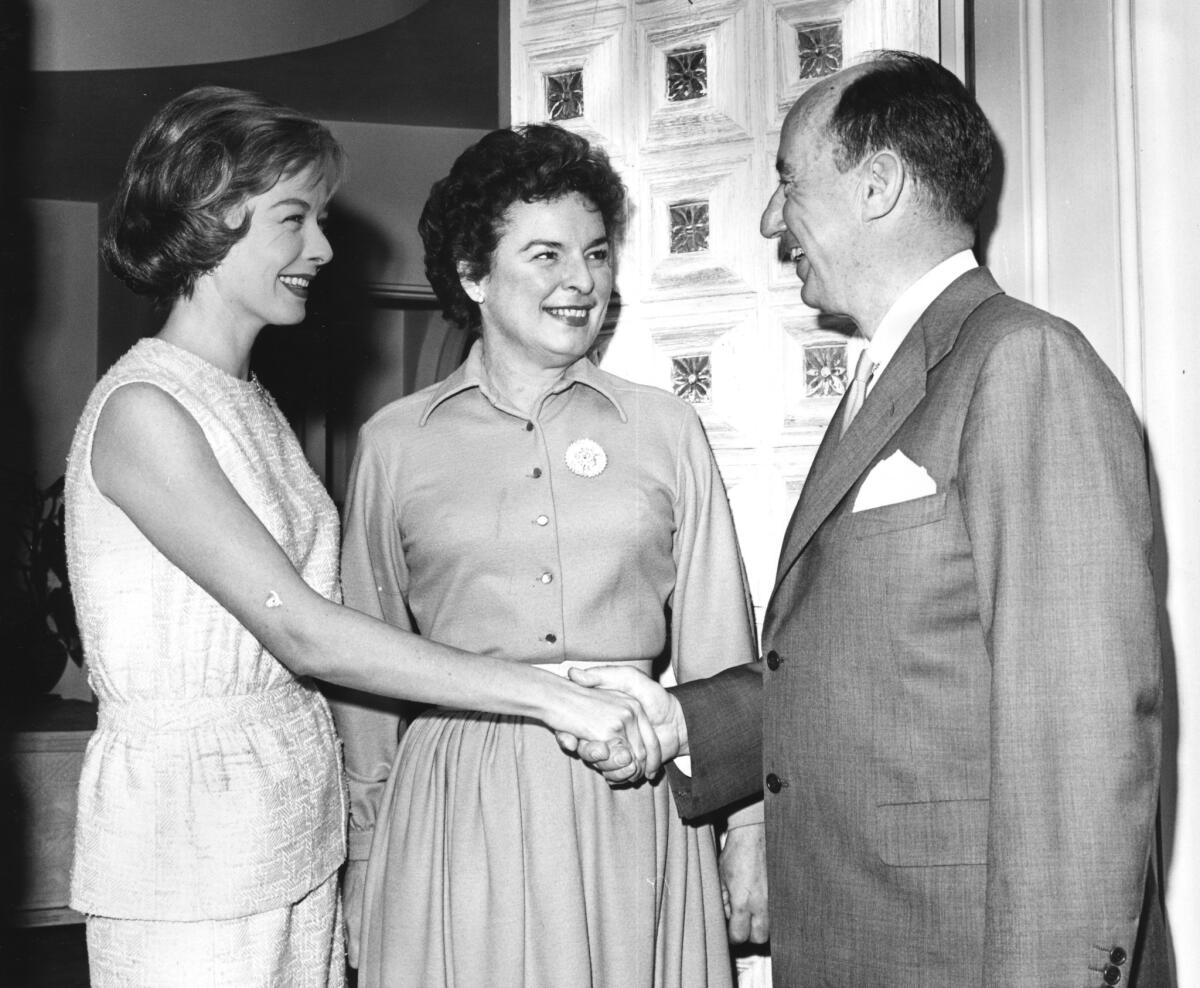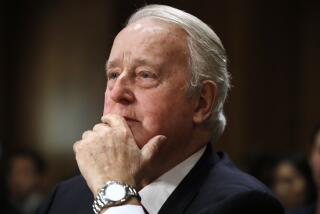From the Archives: Ambassador to U.N., Adlai E. Stevenson, Stricken After Recording Interview

Diana Lynn, left, and Mercedes McCambridge greet Adlai E. Stevenson at Miss Lynn’s Beverly Hills home.
Adlai E. Stevenson, U.S. Ambassador to the United Nations and twice a Democratic candidate for President, collapsed and died of an apparent heart attack Wednesday near the American Embassy in Grosvenor Square.
The unexpected death of the 65-year-old statesman, often called his country’s “liberal conscience,” stunned the world and deeply shocked his many friends in Britain.
(President Johnson announced in Washington that he had appointed an official delegation headed by Vice President Hubert H. Humphrey to fly to London to escort Stevenson’s body home. The delegation took off aboard a special Presidential jet, in which the body will be returned to the United States. The plane is due in London this morning.)
Tapes Interview
Only half an hour before he fell to the sidewalk at 5:10 p.m. as he strolled past the International Sportsmen’s Club on Upper Grosvenor St., he had taped a radio interview affirming his government’s policy in Vietnam.
Radio and television programs were interrupted to report his death. Prime Minister Harold Wilson, a long-standing friend was informed immediately as his met with Labor Party members of Parliament in the House of Commons.
British leaders led a flow of tributes from around the globe. They expressed a grievous sense of loss for a world citizen of wit and intellect acutely appreciated in Britain.
Arrives From Paris
Stevenson arrived from Paris last Saturday on what was announced as a private visit. He was staying at the residence of American Ambassador David K.E. Bruce, Wingfield House in Regents Park.
Although he had no official appointments, he lunched with Wilson over the weekend at the prime minister’s official country residence, Chequers, and visited Foreign Secretary Michael Stewart for half an hour at 10 a.m. Wednesday.
Wednesday afternoon he used an office in the embassy to give an interview to Thomas Barman, diplomatic correspondent for the British Broadcasting Corp. The broadcast was aired five hours after his died.
At about 5 p.m. Stevenson left the embassy and outside met Mrs. Marietta Tree of New York, a U.S. member of the U.N. Trusteeship Council with the rank of ambassador, who was vacationing here with her husband, Ronald Tree, a former Conservative member of Parliament.
As they walked across the square chatting, a news photographer took Stevenson’s picture for the last time.
He collapsed without warning on the sidewalk, and Mrs. Tree called for help and attempted to revive him with mouth-to-mouth resuscitation.
Doctor Called
Dr. Merwin Evans was summoned from the sportsman’s club. He administered an injection and applied cardiac massage. Another doctor from nearby Grosvenor House hotel helped give emergency treatment until an ambulance arrived.
Stevenson was taken to St. George’s Hospital at nearby Hyde Park Corner, but a spokesman said he died en route. The time of death was certified as 5:35 p.m. An official coronor’s report is pending.
Colin Harris, who worked on the radio interview with Barman, said Stevenson took off his jacket and seemed a little short of breath while talking. Those who saw him at the Foreign Office Wednesday morning, however, said he looked well. He had shown no indication of illness and had complained of none. He had planned to return to New York Friday.
Stewart Tribute
Speaking for the British government, Stewart said the world had lost a great statesman who will be remembered not only for what he did and what he stood for but for the tolerant and humorous way he acted.
“He showed a liberality of mind and lucidity of expression which brought him universal renown,” the foreign secretary declared. “But perhaps it was by his own work in the United Nations since 1961 that he will be most vividly remembered throughout the world.
“He will never be forgotten as a man because he was so much an individual, with so much humor, so considerate and firm, yet so gentle. He leaves behind him a great many close friends in this country who loved and respected him.
“The British government expresses their profound sympathy with the people and government of the United States at the tragic death of this great citizen of the world.”
Sir Alec Douglas-Home, leader of the Conservative opposition, echoed the government’s mourning in a cable to President Johnson, and Jo Grimond, Leader of the Liberal Party, eulogized Stevenson as “a great liberal whose fine mind and great political integrity illuminated the age in which he lived.”
The Times of London ran three columns of obituary and an editorial calling Stevenson “more a navigator than a driver” whose great contribution will be that he showed the way even if he never reached the destination.”
Called ‘Tragic Figure’
“Adlai Stevenson,” the Times editorialized, “was one of the tragic figures of American history. He was a prophet before his time who received honor but not in power.
“He died full of disappointments. Yet his life has left a mark that will not be eradicated. Abroad he came to represent that aspect of his country which most sustains foreign confidence in the fundamental virtue of its intentions even when its actions seemed wrong.”
The Guardian in it editorial called him “a reminder that it was not absurd to recall the description of the United States by the greatest of American politicians as the last best hope on earth.”
The Los Angeles born politician and statesman descended from families who emigrated to the American Middle West from the British Isles and his fondness for England was evident.
He once said that if voters in the United States had been British he would have been president. He spent several months leading the U.S. delegation to the preparatory commission for the United Nations in London in 1945, and was a frequent visitor here thereafter.
He is remember appreciatively for his efforts to heal the wounds left by the Anglo-American differences over the Suez Canal dispute of 1956.
“He was admired here,” said Max Benoff, professor of government and public administration at Oxford, “for what the British always admire—being a good loser. He would have made a great secretary of state.”
Stevenson last was in London in May, 1964, when he was concerned with the financial problems over support of U.N. peace-keeping operations, a subject he also discussed on this trip with Stewart.
His trip then was cut short when Secretary of State Dean Rusk summoned him back two days early because of the deteriorating situation at that time in Southeast Asia, particularly in Laos.
The BBC broadcast the taped interview at 10 p.m. as “the last public statement of a great international figure.” Stevenson’s voice, though responsive and quick, seemed to falter a bit at times.
Pressure Cited
Barman asked him to comment on the division of opinion in the United States over developments in Vietnam.
“There has been a great deal of pressure on me in the United States from many sources to take a position, inconsistent with that of my government,” Stevenson replied.
“Actually, I don’t agree with those protestants. My hope in Vietnam is that resistance there may establish the fact that changes in Asia are not to be precipitated by outside force.
“This was the point of view of the Korean war, this is the point of the conflict in Vietnam. I believe that Asia will be more stable in the future if the outcome is the same in both.
Line Respected
“That is to say, a negotiated line beyond which one great power will not attempt to enforce its interests on another, on a negotiated peace, a just honorable peace which leaves the future of the people of South Vietnam to be decided by them, and not forced.
“This after all is what we spent from 1947 to 1952 doing in western Europe. We drew a line, and that line has been, even though we may not all like it, and it’s not a very satisfactory one — it has been respected by the Russians on the one side and by the West on the other.
“And we shall have to come to something like this in Asia.”
At another point, Stevenson said the United State is not in any way incapable of considering or even accepting a compromise in Vietnam, depending on what it is.
He said President Johnson has made it clear the United States would be content with a neutral Vietnam and that the American military effort must continue until negotiation is possible “unless we were to capitulate.”
Stevenson had declined to hold a press conference or to make any public appearances. However, he was persuaded to appear on the BBC television program “Panorama” with Robin Day last Monday.
He fended questions about his reported displeasure with the Johnson policy on Vietnam and said he had no misgivings about the direction of American policy.
Novelist Ernest Hemingway Dies of Gun Wounds
Judy Garland Dies in London at 47; Tragedy Haunted Star
Former San Francisco Mayor Joseph Alioto Dies
John Wayne Dies at 72 of Cancer
Playwright August Wilson Distilled Black America
More to Read
Start your day right
Sign up for Essential California for the L.A. Times biggest news, features and recommendations in your inbox six days a week.
You may occasionally receive promotional content from the Los Angeles Times.






